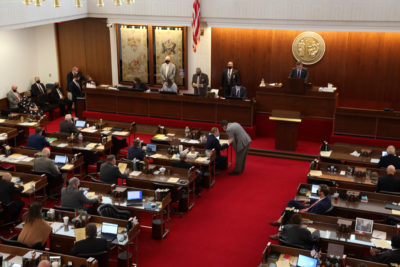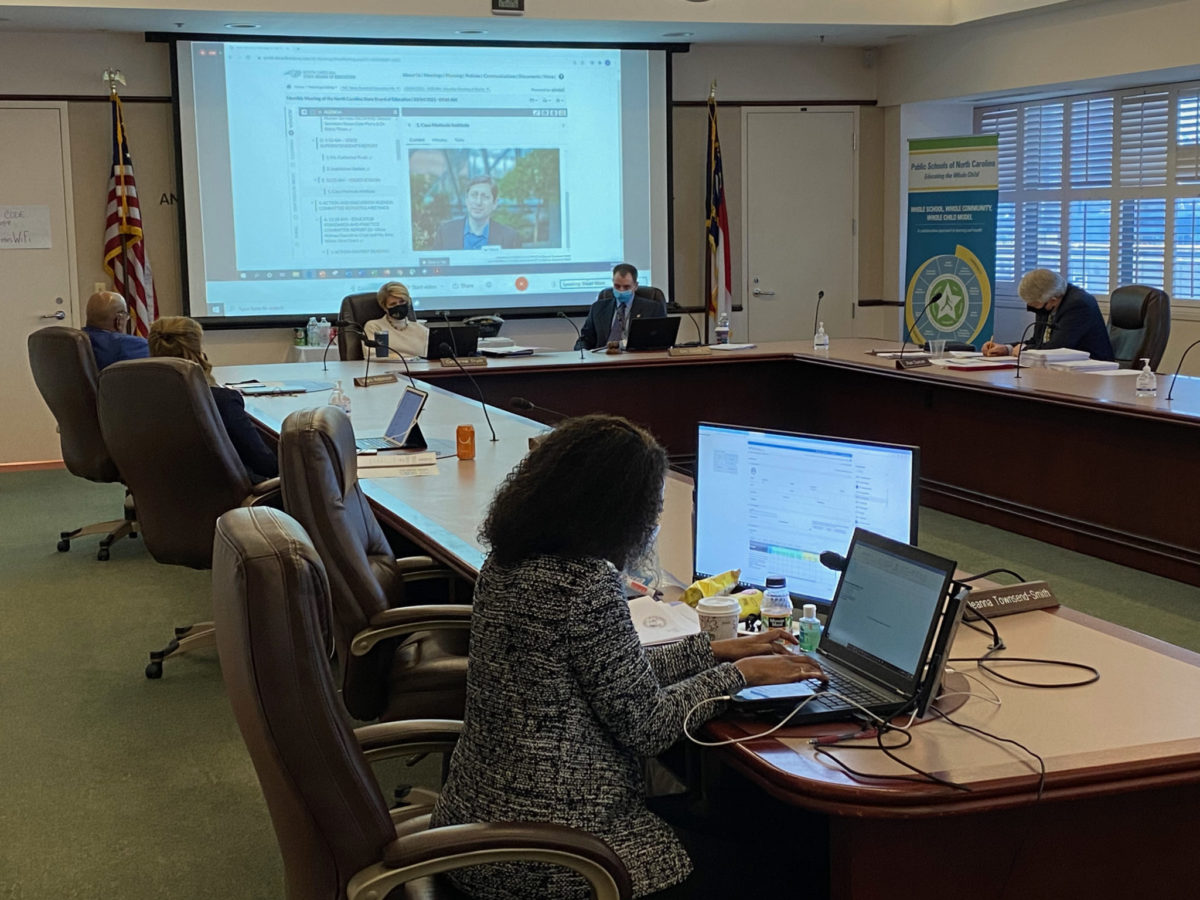

It’s almost been a year since school buildings closed due to COVID-19, and during its March 2021 meeting, the State Board of Education spent a lot of time talking about the fallout from the past year.
State testing
Top of the mind for many concerned about North Carolina education has been whether students are learning or not during a year marked by an emphasis on remote learning.
The State Board heard a report about student performance that looks at how well students did on fall End-of-Course (EOC) and Beginning-of-Grade 3 (BOG3) reading tests.
While the data wasn’t encouraging, it’s important to note that the window in which these tests could be taken was expanded this year due to COVID-19.
Students still have until July 5 to take EOCs. And for the BOG3, students have until March 12. Also, typically, the amount of students taking these tests exceeds 95% of students, but due to the flexibilities granted and the nature of the pandemic, the percentage of students that took or are taking the tests this year are much smaller.
For the EOCs, which encompass NC Math 1, NC Math 3, English II, and biology, 86.3% of all students have taken them. For the BOG3s, 67.7% of third-graders took them.
For the EOCs, with the exception of English II, students performed worse this year than last year, with the majority of students scoring not proficient.
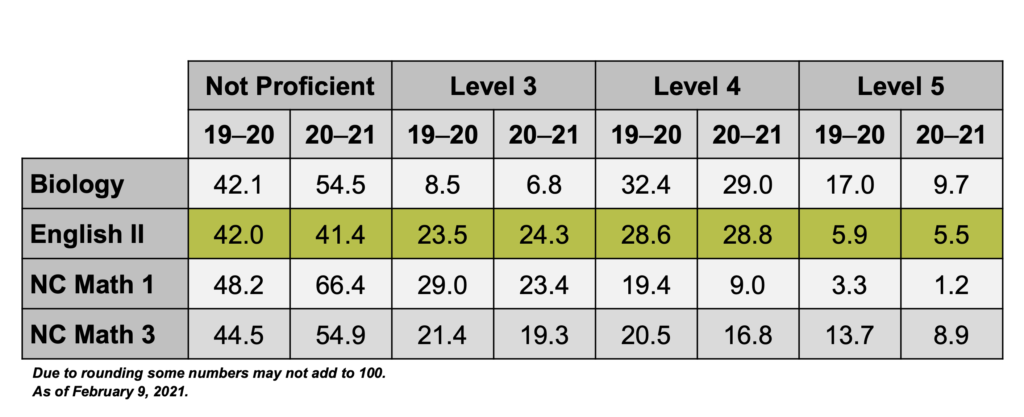

Below are the BOG3 test results by region of the state. Compared to the 2019-20 school year, there was an increase in the percentage of students who scored at the lowest level, and a decrease in the percentage of students scoring at the two highest levels. But this test is meant to be a snapshot of how students are doing in reading at the beginning of third grade, meaning that it’s not necessarily a reflection of learning during COVID-19 — at least not for 2020-21.
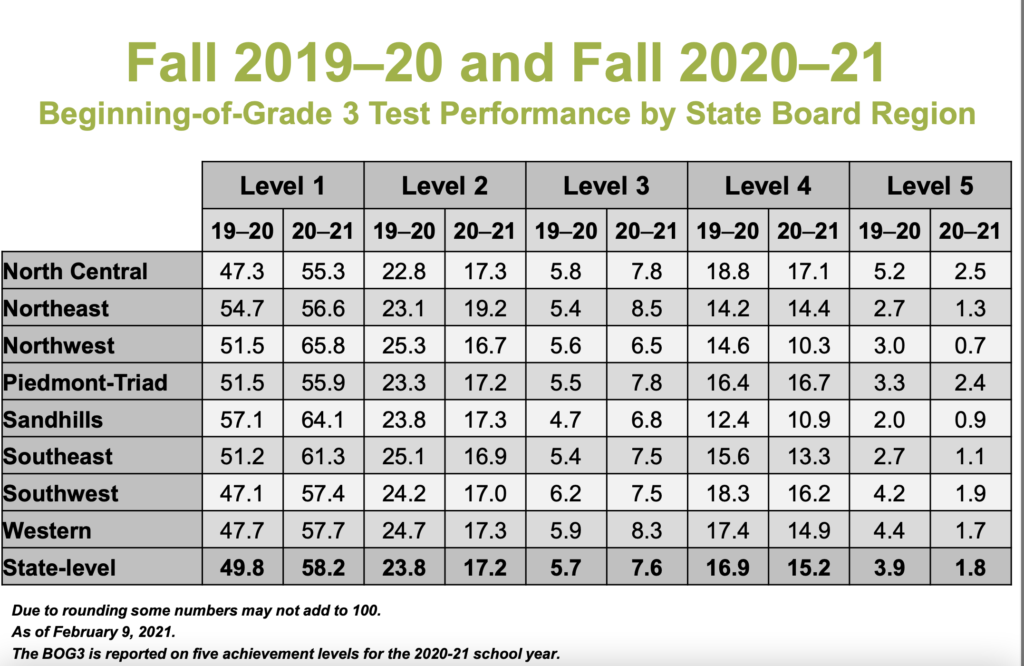

For more detail on the results from both of these tests, check out the entire presentation, starting at slide 11.
Meanwhile, in a Senate education committee on March 3, lawmakers reviewed state Department of Public Instruction data collected from districts around the state showing that almost 23% of students in traditional public schools are “at-risk for academic failure and are not successfully progressing toward grade level promotion.”
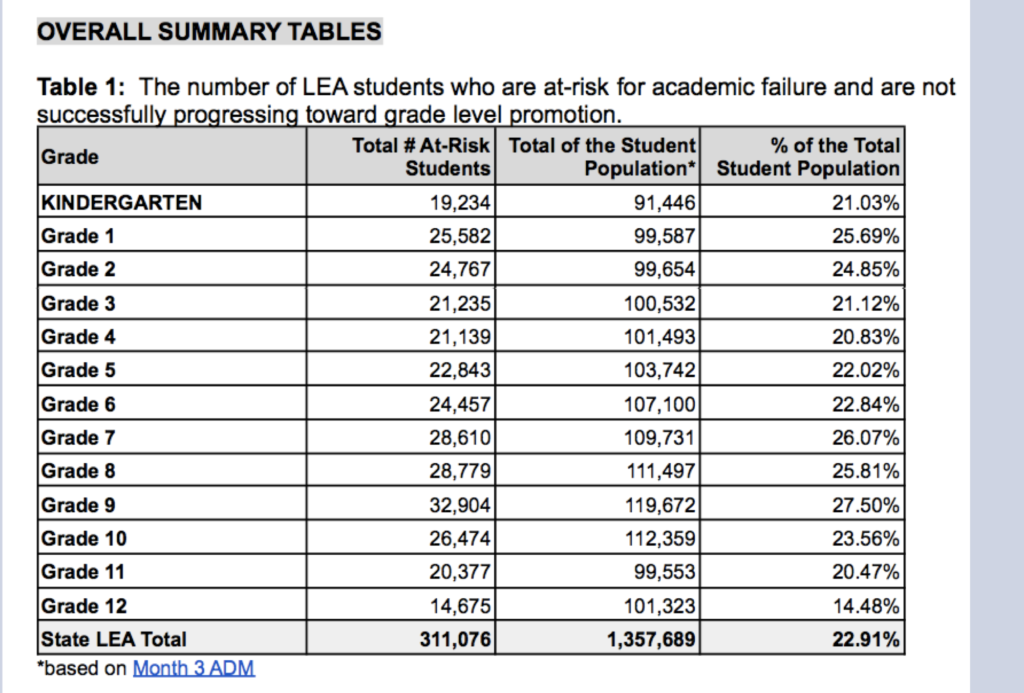

Lawmakers also saw data on charter schools that shows only a little more than 9% of students are in the same danger.
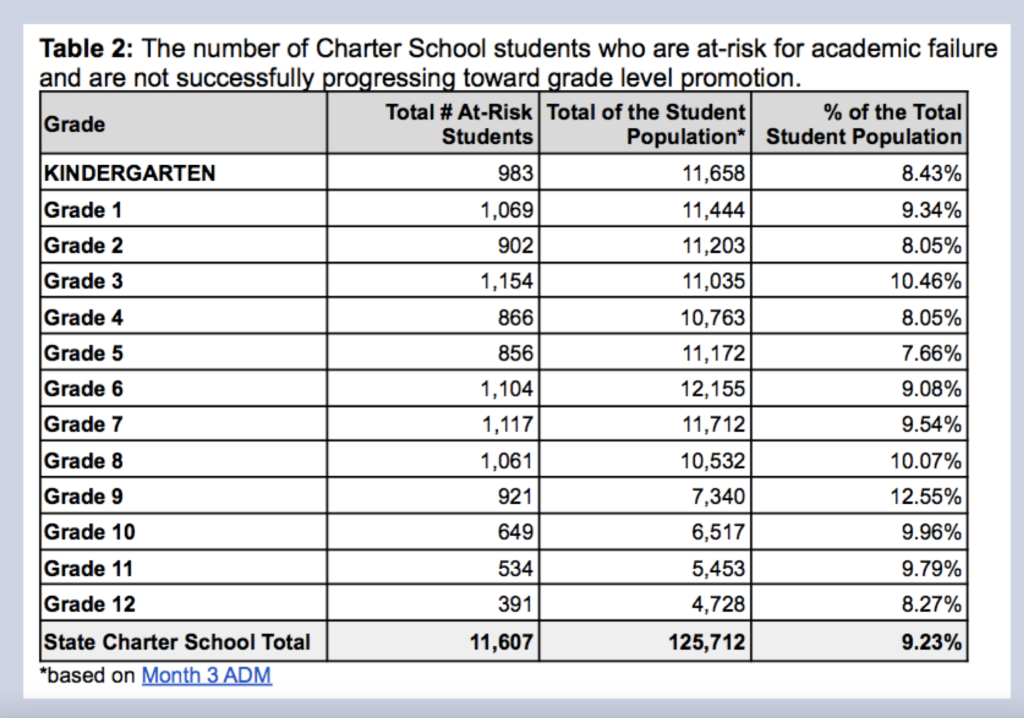

State Superintendent Catherine Truitt told lawmakers earlier in the committee that students have experienced “what appears to be a lost year of learning.”
See the whole presentation below.
Testing for the rest of the year
The State Board also heard about plans for standardized testing for the remainder of the year.
The U.S. Department of Education announced last week that standardized testing required by the federal government must go on. The tests can, however, be delayed or held online, and states can ask for a relaxation of accountability measures. The federal government and the General Assembly allowed North Carolina schools to skip required testing last spring because of COVID-19.
The State Board of Education already voted in January to submit to the federal government requests for two waivers — one related to the percent of students that have to take tests such as the EOC and End-of-Grade (EOG) tests, and one related to the accountability impacts of those tests. Both of these waivers are allowed under federal guidelines.
Among the flexibilities allowed to states, required tests can be administered remotely if possible, but North Carolina still plans to move forward with in-person testing because of the concerns about the validity and reliability of data coming from remote tests.
The State Board is also pursuing waivers from the General Assembly for accountability measures such as the school performance grades.
You can see the whole presentation in the first part of the slide deck below.
In-person school
At the beginning of the State Board of Education meeting on March 3, Chair Eric Davis said that by the end of the month, the Board “expects” all districts in the state “are or will be returning students to in-person instruction.”
The same day that he said that, the Senate voted to reconsider the override of Gov. Roy Cooper’s veto of a bill that would have required districts to bring students back into classrooms.
The legislation would make schools open for exceptional needs students under plan A, and under either plan A or plan B for all other students. Plan A is full-time in-person education with minimal social distancing. Plan B is typically a hybrid of in-person and remote learning, with six feet of social distancing.
No district would be able to solely offer remote learning to students, but families who want their students to remain fully virtual would still have that option. The bill doesn’t apply to charter schools, only traditional public schools.
Cooper vetoed the bill last Friday, Feb. 26. The Senate attempted and failed to override it on Monday, March 1.
But on March 3, the same day that the Senate voted to reconsider the veto override, the state Department of Health and Human Services (DHHS) revised its school COVID-19 guidelines to say that all schools — traditional and charter — should “return to in-person instruction to the fullest extent possible up to five days per week.” The guidelines state that remote learning should only be an option offered for those who need it.
Senate Democrats also sent a letter to the State Board of Education urging them to offer in-person instruction to students.
The State Board of Education voted Thursday, March 4, the second day of its March meeting, to adopt that new DHHS guidance. Earlier in that meeting, they heard a presentation about that guidance.
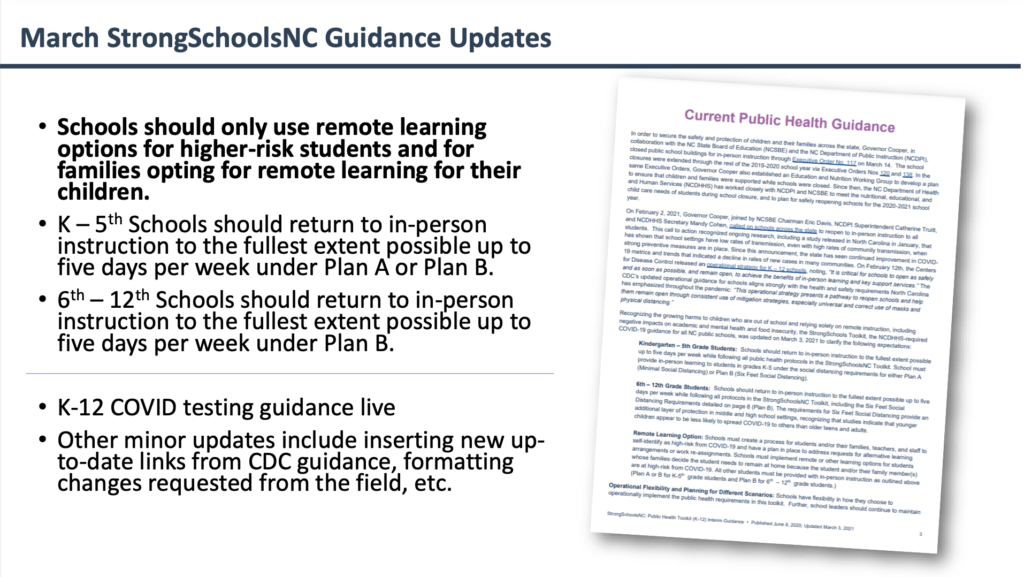

Included in that presentation was the latest data on COVID-19 in schools.
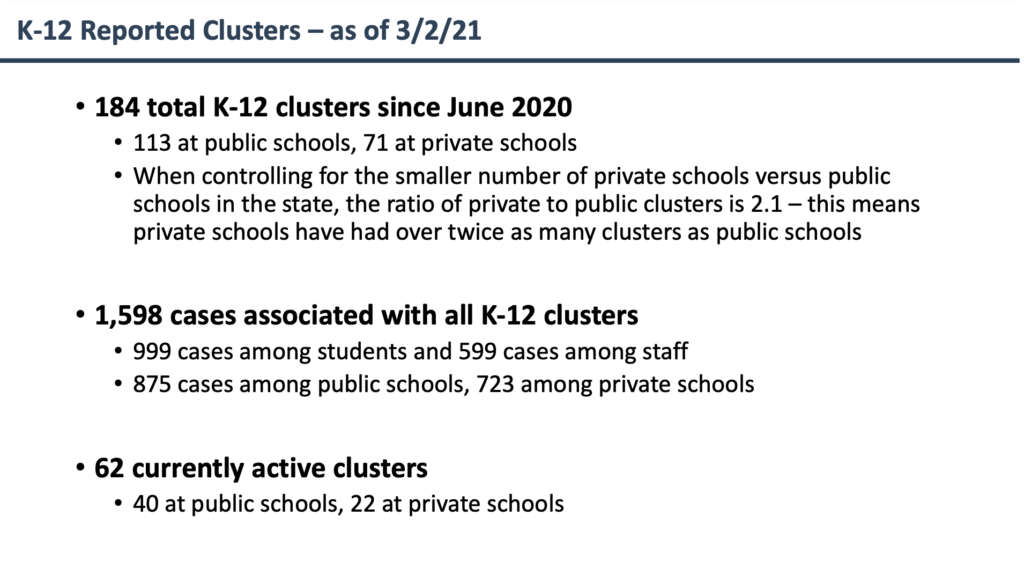

“I can’t say it with more importance: it is absolutely essential that we get our students back into school,” said Davis after the presentation.
Truitt questioned DHHS staff after the presentation about when grades 6-12 can move to plan A. Currently, elementary students are allowed in schools under plan A, but other grades can only use a hybrid model of remote and in-person learning.
DHHS staff said that as metrics improve, a move to plan A in the older grades may be possible, but Truitt said that DHHS needs to establish better guidelines for when plan A will be feasible for grades 6-12.
She equated what DHHS is doing with “kicking the can down the street,” and said DHHS needs to “put a stake in the ground,” and explain what needs to happen for older grades to return to school under plan A.
State Treasurer Dale Folwell, a State Board member, agreed with Truitt, saying that the impact of not having kids in schools isn’t just on students but on parents as well. He said that having kids out of schools makes it harder for parents to go back to work.
In adopting the DHHS guidance, the State Board also approved a resolution that said, among other things, “that the governing boards of all North Carolina public school units should resume providing all students enrolled in grades kindergarten through twelfth grade with the option of in-person learning to the fullest extent possible consistent with the guidelines in the North Carolina Strong Schools Toolkit and the health and safety needs of the students, beginning no later than the end of March of 2021 and that such governing boards should adopt plans to accomplish this reopening as soon as possible.”
Davis also said that the State Board is ready to call a special meeting to move grades 6-12 into plan A when DHHS guidelines change to make that possible.
Here is the full resolution.
Here is the complete presentation from DHHS.
Legislative priorities
The State Board of Education revised its legislative priorities this month, changing their total legislative ask from about $184.7 million to about $234.5 million.
Here is a high-level look at the revised priorities.
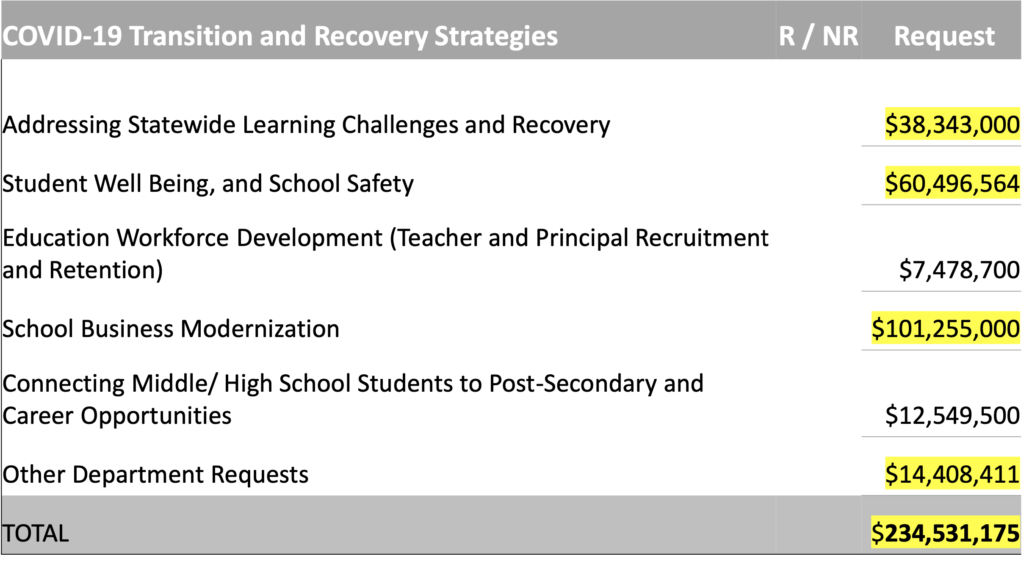

Here is what those priorities looked like last month when they were initially adopted.
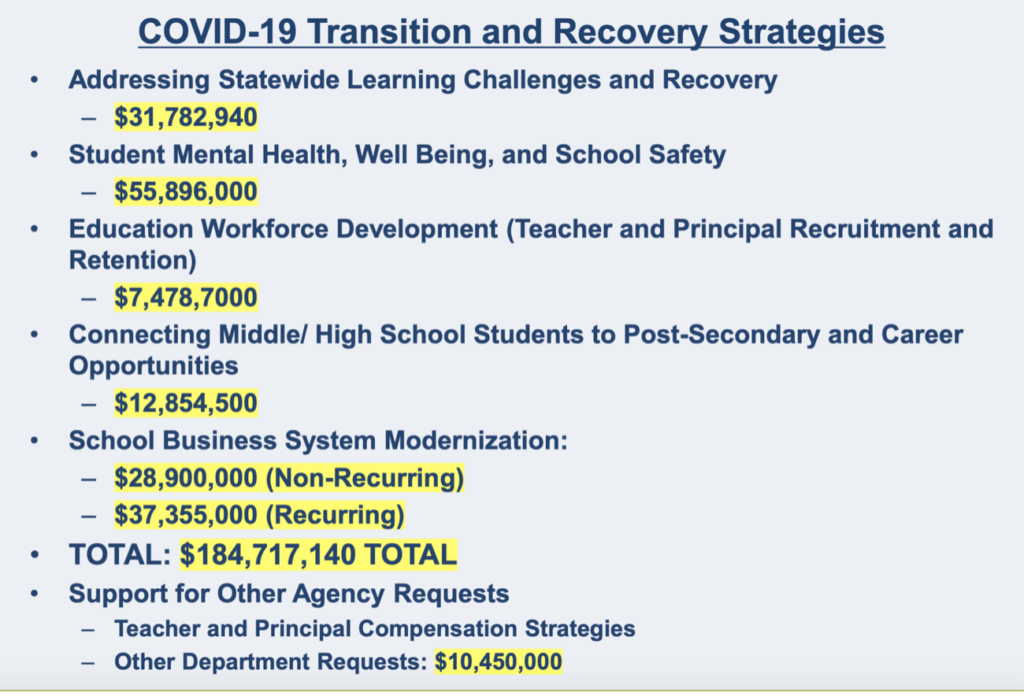

Changes on individual line items include more funding for science of reading training, a competency-based education platform, child nutrition, the addition of more than $39 million in both recurring and non-recurring funding for “cybersecurity expansion and training,” and the addition of $1.6 million for Governor’s School expansion. According to the presentation, without additional funding, the Governor’s School might have to reduce services or raise tuition.
See the whole presentation below.
Transforming principal preparation
The State Board of Education also heard updates on the progress of the transforming principal preparation program, which was established and funded by the General Assembly back in 2015-16.
Shirley Prince is director of North Carolina Alliance for School Leadership Development, which was the initial administrator of the program that continues to work with three of the participating schools through this school year. She is also the executive director of the NC Principals and Assistant Principals Association.
We will have a more in-depth article on the program at a later date, but in the meantime, here is the presentation.
As of June 30, 2021, the transforming principal preparation program will merge with the North Carolina Principal Fellows Program. The State Board also heard a little bit about the Principal Fellows program and the merger. See that presentation below.
Editor’s note: Shirley Prince serves on EducationNC’s Board of Directors.


